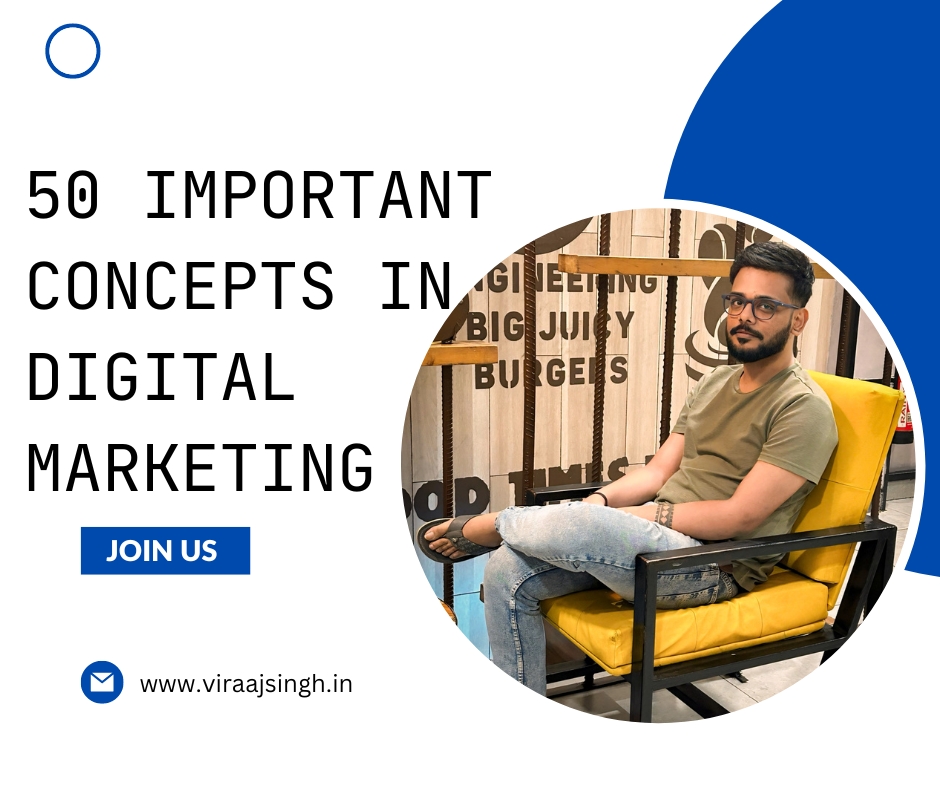Digital marketing is a dynamic and ever-evolving field, with numerous strategies and techniques to master. Whether you’re a seasoned marketer or just starting, understanding these 50 key concepts will enhance your ability to navigate the digital landscape and drive success.
- SEO (Search Engine Optimization): The practice of optimizing your website to rank higher in search engine results pages (SERPs).
- Content Marketing: Creating and distributing valuable content to attract and engage your target audience.
- Social Media Marketing: Using social media platforms to promote your brand and connect with your audience.
- PPC (Pay-Per-Click) Advertising: A model where advertisers pay each time their ad is clicked, commonly used in search engine and display advertising.
- Email Marketing: Sending targeted messages to a list of subscribers to nurture leads and build customer relationships.
- Affiliate Marketing: Partnering with affiliates who promote your products in exchange for a commission on sales.
- Influencer Marketing: Collaborating with influential personalities to promote your brand.
- Conversion Rate Optimization (CRO): Enhancing your website to increase the percentage of visitors who take a desired action.
- Analytics: Using tools like Google Analytics to track and analyze website and campaign performance.
- A/B Testing: Comparing two versions of a webpage or ad to determine which performs better.
- Retargeting: Serving ads to people who have previously visited your website.
- Keyword Research: Identifying and analyzing the search terms people use to find information online.
- User Experience (UX): Designing websites and apps that provide a positive and intuitive user experience.
- Responsive Design: Creating websites that adapt to different screen sizes and devices.
- Mobile Marketing: Strategies to reach users on their smartphones and tablets.
- Video Marketing: Using video content to engage and convert your audience.
- Local SEO: Optimizing your online presence to attract local customers.
- Voice Search Optimization: Tailoring your content for voice search queries.
- Customer Journey Mapping: Visualizing the steps a customer takes from awareness to purchase.
- Brand Storytelling: Crafting narratives that resonate with your audience and build brand loyalty.
- Landing Pages: Dedicated pages designed to capture leads or drive specific actions.
- Call to Action (CTA): Prompts that encourage users to take a specific action.
- Lead Generation: Attracting and converting prospects into leads.
- Marketing Automation: Using software to automate repetitive marketing tasks.
- Customer Relationship Management (CRM): Managing interactions with current and potential customers.
- Webinar Marketing: Using online seminars to educate and engage your audience.
- E-commerce Marketing: Strategies to promote and sell products online.
- Personalization: Tailoring marketing messages to individual users based on their behavior and preferences.
- Segmentation: Dividing your audience into smaller groups based on characteristics like demographics or behavior.
- Influencer Outreach: Building relationships with influencers to amplify your brand message.
- Content Curation: Collecting and sharing relevant content from other sources.
- Social Proof: Using testimonials, reviews, and endorsements to build trust with your audience.
- Behavioral Targeting: Serving ads based on users’ previous behavior.
- Geo-Targeting: Delivering content or ads to users based on their geographic location.
- Real-Time Marketing: Responding to events or trends as they happen.
- Interactive Content: Creating engaging content that encourages user participation.
- User-Generated Content (UGC): Content created by your customers that promotes your brand.
- Influencer Marketing Platforms: Tools to connect with and manage influencer collaborations.
- Chatbots: AI-powered tools that engage with website visitors in real time.
- Augmented Reality (AR) Marketing: Using AR to create immersive brand experiences.
- Podcast Marketing: Promoting your brand through audio content.
- SEO Audits: Comprehensive evaluations of your website’s SEO performance.
- Link Building: Acquiring backlinks from other websites to improve your SEO.
- Schema Markup: Structured data that helps search engines understand your content.
- Heatmaps: Visual representations of where users click, scroll, and interact on your website.
- Google Ads: Google’s advertising platform for PPC campaigns.
- Facebook Ads: Advertising on Facebook’s platform to reach a targeted audience.
- Instagram Marketing: Using Instagram to promote your brand and engage with users.
- LinkedIn Marketing: Leveraging LinkedIn for B2B marketing and professional networking.
- Twitter Marketing: Engaging with your audience and promoting your brand on Twitter.
Mastering these concepts can significantly enhance your digital marketing efforts, leading to more effective campaigns and better results. Stay updated with the latest trends and continuously refine your strategies to stay ahead in the competitive digital landscape.
